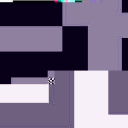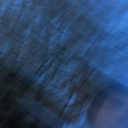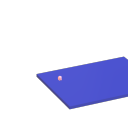ELSE 1.0-0 RC12 with Live Electronics Tutorial Released
Hi, it's been a while, here we go:
RELEASE NOTES:
Hi, it's been almost 8 months without an update and I never took this long!!! So there's a lot of new stuff to cover, because it's not like I've been just sleeping around 
The reason for the delay is that I'm trying to pair up with the release cycles of PlugData and we're having trouble syncing up. PlugData 0.9.0 came out recently after a delay of 6 months and we couldn't really sync and pair up then... we had no luck in syncing for a new update now, so now I'm just releasing it up cause enough is enough, and hopefully in the next plugdata release we can sync and offer the same version.
As usual, the development pace is always quite busy and I'm just arbitrarily wrapping things up in the middle of adding more and more things that will just have to wait.
First, I had promised support for double precision. I made changes so we can build for it, but it's not really working yet when I uploaded to deken and tested it. So, next time?
And now for the biggest announcement: - I'm finally and officially releasing a new pack as a submodule, which is a set of abstractions inspired by EuroRack Modules, so I'm thinking of VCV like things but into the Pd paradigm. Some similar stuff has been made for Pd over the years, most notably and famously "Automatonism", but I'm really proud of what I'm offering. I'm not trying to pretend Pd is a modular rack and I'm taking advantage of being in Pd. I'm naming this submodule "Modular EuroRacks Dancing Along" (💩 M.E.R.D.A 💩) and I've been working on it for a year and a half now (amongst many other things I do). PlugData has been offering this for a while now, by the way. Not really fully in sync though.
MERDA modules are polyphonic, thanks to multichannel connections introduced in Pd 0.54! There are 20 modules so far and some are quite high level. I'm offering a PLAITS module based on the Mutable Instruments version. I have a 6-Op Phase Modulation module. A "Gendyn" module which is pretty cool. I'm also including an "extra" module that is not really quite a modular thing at all but fits well called "brane", which was a vanilla patch I first wrote like 15 years ago and is a cool granular live sampler and harmonizer. You'll also find the basics, like oscillators, filters, ADSR envelope and stuff I'm still working on. Lastly, a cool thing is that it has a nice presets system that still needs more work but is doing the job so far.
There are ideas and plans to add hundreds more MERDA modules, let's see when and if I can. People can collaborate and help me and create modules that follow the template by the way 
Thanks to Tim Schoen, [play.file~] is now a compiled object instead of an abstraction and it supports MP3, FLAC, WAV, AIF, AAC, OGG & OPUS audio file extensions. A new [sfload] object can import these files into arrays (but still needs lots of more work). There are many other player objects in ELSE that can load and play samples but these don't yet support these new formats (hang in there for the next version update).
Tim also worked on new [pdlink] and [pdlink~] objects, which send control and signal data to/from Pd instances, versions and even forks of Pure Data (it's like [send]/[receive] and [send~]/[receive~], all you need is a symbol, no complicated network or OSC configuration!). And yes, it works via UDP between different computers on the same network. And hell yeah, [pdlink~] has multichannel connections support! By the way, you can also communicate to a [pd~] subprocess. This will be part of ELSE and PlugData of course, and will allow easy communication between PlugData and Pd-Vanilla for instance.
The great pd-lib-build system has been replaced for a 'cmake' build process called 'pd.build' by Pierre Guillot. This was supposed to simplify things. Also, the [sfont~] object was a nightmare to build and with several dependencies that was simply hell to manage, now we have a new and much simpler system and NO DEPENDENCIES AT ALL!!! Some very rare file formats with obscure and seldom sound file extensions may not work though... (and I don't care, most and the 'sane' ones will work). The object now also dumps all preset information with a new message and backwards compatibility broke a bit 
I'm now back to offering a modified version of [pdlua] as part of ELSE, which has recently seen major upgrades by Tim to support graphics and signals! This is currently needed in ELSE to provide a new version of [circle] that needed to be rewritten in lua so it'd look the same in PlugData. Ideally I'd hope I could only offer compiled GUI objects, but... things are not ideal 
The lua loader works by just loading the ELSE library, no need for anything "else". I'm not providing the actual [pdlua] and [pdluax] objects as they are not necessary, and this is basically the only modification. Since PlugData provides support for externals in lua, if you load ELSE you can make use of stuff made for PlugData with lua without the need to install [pdlua] in Pd-Vanilla.
For next, we're working on a [lua] object that will allow inline scripting and will also work for audio signals (again, wait for the next version)! Also for the next version, I'm saving Ben Wesch's nice 3d oscilloscope made in lua (it'll be called [scope3d~]). There's a lot going on with the lua development, which is very exciting.
As for more actual new objects I'm including, we have [vcf2~] and [damp.osc~]. The first is a complex one pole resonant filter that provides a damping oscillation for a ringing time you can set, the next is an oscillator based on it. There's also the new [velvet~] object, a cool and multichannel velvet noise generator that you can also adjust to morph into white noise.
I wasn't able to add multichannel capabilities to many existing objects in ELSE in this one, just a couple of them ([cosine~] and [pimp~]). Total number of objects that are multichannel aware now are: 92! This is almost a third of the number of audio objects in ELSE. I think that a bit over half might be a reasonably desired target. More multichannel support for existing objects to come in the next releases.
Total number of objects in the ELSE library is now 551!
As for the Live Electronics tutorial, as usual, there are new examples for new objects, and I made a good revision of the advanced filter section, where I added many examples to better explain how [slop~] works, with equivalent [fexpr~] implementations.
Total number of examples in the Live Electronics Tutorial is now 528!
There are more details of course, and breaking changes as usual, but these are the highlights! For a full changelog, check https://github.com/porres/pd-else/releases/tag/v.1.0-rc12 (or below at this post).
As mentioned, unfortunately, ELSE RC12 is not yet fully merged, paired up and 100% synced in PlugData. PlugData is now at version 0.9.1, reaching the 1.0 version soon. Since ELSE is currently so tightly synced to the development of PlugData, the idea is to finally offer a final 1.0 version of ELSE when PlugData 1.0 is out. Hence, it's getting closer than ever  Hopefully we will have a 100% synced ELSE/PlugData release when 0.9.2 is out (with a RC 13 maybe?).
Hopefully we will have a 100% synced ELSE/PlugData release when 0.9.2 is out (with a RC 13 maybe?).
Please support me on Patreon https://www.patreon.com/porres
You can follow me on instagram as well if you like... I'm always posting Pd development stuff over there https://www.instagram.com/alexandre.torres.porres/
cheers
ps. Binaries for mac/linux/windows are available via deken. I needed help for raspberry pi
CHANGELOG:
LIBRARY:
Breaking changes:
- [oscope~] renamed to [scope~]
- [plaits~] changed inlet order of modulation inputs and some method/flags name. If a MIDI pitch of 0 or less input is given, it becomes a '0hz'.
- [gbman~] changed signal output range, it is now filtered to remove DC and rescaled to a sane -1 to 1 audio range.
- [dust~] and [dust2~] go now up to the sample rate and become white noise (removed restriction that forced actual impulses, that is, no conscutive non zero values)
- [cmul~] object removed (this was only used in the old conv~ abstraction to try and reduce a bit the terrible CPU load)
- [findfile] object removed (use vanilla's [file which] now that it has been updated in Pd 0.55-0)
- [voices] swapped retrig modes 0 and 1, 'voices' renamed to 'n', now it always changes voice number by default as in [poly] (this was already happening unintentionally as a bug when one voice was already taken). The 'split' mode was removed (just use [route], will you?)
- [voices~] was also affected by changes in [voices] of course, such as 'voices' message being renamed to 'n'.
- [sr~]/[nyquist] changed output loading time to 'init' bang
- [sample~] object was significantly redesigned and lots of stuff changed, new messages and flags, added support for 64-bit audio files (Pd 0.55 in double precision and ELSE compiled for 64 bits is required for this). Info outlet now also outputs values for lenght in ms and bit depth.
- [sfont~] uses now a simpler build system and this might not load very very rare and unusual sound formats.
Enhancements/fixes/other changes:
- builds for double precision is now supposedly supported, by the way, the build system was changed from pd-lib-builder to pd.build by Pierre Guillot.
- [play.file~] is now a compiled object instead of an abstraction thanks to Tim Schoen, and it supports MP3, FLAC, WAV, AIF, AAC, OGG & OPUS file extensions.
- Support for double precision compilation was improved and should be working for all objects (not yet providing binaries and fully tested yet by the way).
- The ELSE binary now loads a modified version of [pdlua], but no [pdlua] and [pdluax] objects are provided.
- added signal to 2nd inlet of [rm~].
- fixed 'glide' message for [mono~].
- fixed [voices] consistency check bug in rightmost outlet and other minor bugs, added flags for 'n', 'steal' and offset.
- [gain~] and [gain2~] changed learn/forget shortcut
- [knob] fixed sending messages to 'empty' when it shouldn't, ignore nan/inf, prevent a tcl/tk error if lower and upper values are the same; added "learn/forget" messages and shortcut for a midi learn mechanism.
- [mpe.in] now outputs port number and you can select which port to listen to.
- Other MIDI in objects now deal with port number encoded to channel as native Pd objects. Objects affected are [midi.learn], [midi.in], [note.in], [ctl.in], [bend.in], [pgm.in], [touch.in] and [ptouch.in].
- [pi]/[e] now takes a value name argument.
- [sr~]/[nyquist~] take clicks now and a value name argument.
- fixed phase modulation issues with [impulse~] and [pimp~].
- [cosine~] fixed sync input.
- added multichannel features to [cosine~] and [pimp~].
- [plaits~] added a new 'transp' message and a functionality to allow MIDI input to supersede signal connections (needed for the 'merda' version [see below]), fixed MIDI velocity.
- [pluck~] added a new functionality to allow MIDI input to supersede signal connections (needed for the 'merda' version [see below]).
- 26 new objects, [velvet~], [vcf2~], [damp.osc~], [sfload], [pdlink] and [pdlink~], plus abstractions from a newly included submodule called "Modular Euro Racks Dancing Along" (M.E.R.D.A)! Warning, this is all just very very experimental still, the object are: [adsr.m~], [brane.m~], [chorus.m~], [delay.m~], [drive.m~], [flanger.m~], [gendyn.m~], [lfo.m~], [phaser.m~], [plaits.m~], [plate.rev.m~], [pluck.m~], [pm6.m~], [presets.m], [rm.m~], [seq8.m~], [sig.m~], [vca.m~], [vcf.m~] and [vco.m~] (6 of these are multichannel aware).
Objects count: total of 551 (307 signal objects [92 of which are MC aware] and 244 control objects)!
- 311 coded objects (203 signal objects / 108 control objects
- 240 abstractions (104 signal objects / 136 control objects)
TUTORIAL:
- New examples and revisions to add the new objects, features and breaking changes in ELSE.
- Added a couple of examples for network communication via FUDI and [pdlink]/[pdlink~]
- Section 36-Filters(Advanced) revised, added more examples and details on how [slop~] works.
- Total number of examples is now 528!
Randomly can not edit, have to close and reopen subpatch
adding here that i need to revise this statement:
if i compile
Pd 0.55.0withWish-8.6.12, i get a build that works perfectly fine
... with this build, the switch between edit- and perform-mode do work as stated, but somehow, clicks sometimes are just ignored. this happens in both modes (and in the "temporary perform mode" with Cmd+Click). and since this is not an issue with Pd 0.53-2, there does seem to be some issue through changes on the Pd side.
Tested with:
[hradio]where i'm just clicking through all states: sometimes the state just doesn't change- alternately clicking inside a
[+ ]object to edit it and outside to deselect: sometimes, it doesn't select the object text and sometimes it doesn't deselect the object.
EDIT: my assumption was also wrong that this other issue is not a case with Pd 0.53-2. seems like there is only the choice between the 2 issues, depending on the Wish version. :/
Trying to understand how to compile PD Externals (static library and Windows)
Hello all,
I have recently stumbled into some problems compiling PD externals. I figured I would post here, it's a two part question
Compiling on/for Windows:
The first, and likely easier question, is I am trying to compile this external for the ES-5 encoder provided by Expert Sleepers for their DC coupled Eurorack interface:
https://github.com/expertsleepersltd/externals/tree/master/pd/es5encoder~
However, when I attempted to run the makefile I am encountering numerous errors that lead me to believe my environment isn't setup for compiling PD externals. Is there somewhere that outlines how to compile an external like this where there is limited/no documentation in the README? I don't know how generic of a process it is and if it's fairly standardized.
Second question:
I have a library that I would like to use with PDParty (iemmatrix) and I need to compile this into a static library to be able to use it on iOS. Is compiling to a static library drastically different than to a dynamic one? Are there limitations design wise that particular libraries might be incompatible with?
Sorry if the wording here is confusing at all. I haven't dealt much with compiling libraries for different platforms so I am a bit lost on some of the basics.
Any help, as always, is greatly appreciated
Building on Windows - works from Git source, not from tarball
I wanted to build PD on Windows 10 to get ASIO support. I failed when I used the "Source" files from the PD website. I succeeded when I used source that I cloned from Github. I followed the same instructions from the wiki both when I failed and when I succeeded. (They are the same as in the manual, just a little more concise.)
I am sharing below my terminal output from the failed build attempts from the downloaded source code (the tar.gz file). Some of these messages suggest that there might be errors in the makefiles. I don't know anything about makefiles, so I can't really interpret the errors. But I did want to pass them along, in case a developer might find them useful. Here you go:
bhage@LAPTOP-F1TU0LRH MINGW64 /c/Users/bhage/Downloads/pd-0.51-4
$ ./autogen.sh
libtoolize: putting auxiliary files in AC_CONFIG_AUX_DIR, 'm4/config'.
libtoolize: linking file 'm4/config/config.guess'
libtoolize: linking file 'm4/config/config.sub'
libtoolize: linking file 'm4/config/install-sh'
libtoolize: linking file 'm4/config/ltmain.sh'
libtoolize: putting macros in AC_CONFIG_MACRO_DIRS, 'm4/generated'.
libtoolize: linking file 'm4/generated/libtool.m4'
libtoolize: linking file 'm4/generated/ltoptions.m4'
libtoolize: linking file 'm4/generated/ltsugar.m4'
libtoolize: linking file 'm4/generated/ltversion.m4'
libtoolize: linking file 'm4/generated/lt~obsolete.m4'
configure.ac:166: warning: The macro `AC_LIBTOOL_DLOPEN' is obsolete.
configure.ac:166: You should run autoupdate.
aclocal.m4:8488: AC_LIBTOOL_DLOPEN is expanded from...
configure.ac:166: the top level
configure.ac:166: warning: AC_LIBTOOL_DLOPEN: Remove this warning and the call to _LT_SET_OPTION when you
configure.ac:166: put the 'dlopen' option into LT_INIT's first parameter.
../autoconf-2.71/lib/autoconf/general.m4:2434: AC_DIAGNOSE is expanded from...
aclocal.m4:8488: AC_LIBTOOL_DLOPEN is expanded from...
configure.ac:166: the top level
configure.ac:167: warning: The macro `AC_LIBTOOL_WIN32_DLL' is obsolete.
configure.ac:167: You should run autoupdate.
aclocal.m4:8523: AC_LIBTOOL_WIN32_DLL is expanded from...
configure.ac:167: the top level
configure.ac:167: warning: AC_LIBTOOL_WIN32_DLL: Remove this warning and the call to _LT_SET_OPTION when you
configure.ac:167: put the 'win32-dll' option into LT_INIT's first parameter.
../autoconf-2.71/lib/autoconf/general.m4:2434: AC_DIAGNOSE is expanded from...
aclocal.m4:8523: AC_LIBTOOL_WIN32_DLL is expanded from...
configure.ac:167: the top level
configure.ac:168: warning: The macro `AC_PROG_LIBTOOL' is obsolete.
configure.ac:168: You should run autoupdate.
aclocal.m4:121: AC_PROG_LIBTOOL is expanded from...
configure.ac:168: the top level
configure.ac:182: warning: The macro `AC_HEADER_STDC' is obsolete.
configure.ac:182: You should run autoupdate.
../autoconf-2.71/lib/autoconf/headers.m4:704: AC_HEADER_STDC is expanded from...
configure.ac:182: the top level
configure.ac:213: warning: The macro `AC_TYPE_SIGNAL' is obsolete.
configure.ac:213: You should run autoupdate.
../autoconf-2.71/lib/autoconf/types.m4:776: AC_TYPE_SIGNAL is expanded from...
configure.ac:213: the top level
configure.ac:235: warning: The macro `AC_CHECK_LIBM' is obsolete.
configure.ac:235: You should run autoupdate.
aclocal.m4:3879: AC_CHECK_LIBM is expanded from...
configure.ac:235: the top level
configure.ac:276: warning: The macro `AC_TRY_LINK' is obsolete.
configure.ac:276: You should run autoupdate.
../autoconf-2.71/lib/autoconf/general.m4:2920: AC_TRY_LINK is expanded from...
m4/universal.m4:14: PD_CHECK_UNIVERSAL is expanded from...
configure.ac:276: the top level
configure.ac:168: installing 'm4/config/compile'
configure.ac:9: installing 'm4/config/missing'
asio/Makefile.am: installing 'm4/config/depcomp'
bhage@LAPTOP-F1TU0LRH MINGW64 /c/Users/bhage/Downloads/pd-0.51-4
$ autoupdate
configure.ac:182: warning: The preprocessor macro `STDC_HEADERS' is obsolete.
Except in unusual embedded environments, you can safely include all
ISO C90 headers unconditionally.
configure.ac:213: warning: your code may safely assume C89 semantics that RETSIGTYPE is void.
Remove this warning and the `AC_CACHE_CHECK' when you adjust the code.
bhage@LAPTOP-F1TU0LRH MINGW64 /c/Users/bhage/Downloads/pd-0.51-4
$ ^C
bhage@LAPTOP-F1TU0LRH MINGW64 /c/Users/bhage/Downloads/pd-0.51-4
$ ./configure
configure: loading site script /etc/config.site
checking for a BSD-compatible install... /usr/bin/install -c
checking whether build environment is sane... yes
checking for a race-free mkdir -p... /usr/bin/mkdir -p
checking for gawk... gawk
checking whether make sets $(MAKE)... yes
checking whether make supports nested variables... yes
checking build system type... x86_64-w64-mingw32
checking host system type... x86_64-w64-mingw32
configure: iPhone SDK only available for arm-apple-darwin hosts, skipping tests
configure: Android SDK only available for arm-linux hosts, skipping tests
checking for as... as
checking for dlltool... dlltool
checking for objdump... objdump
checking how to print strings... printf
checking whether make supports the include directive... yes (GNU style)
checking for gcc... gcc
checking whether the C compiler works... yes
checking for C compiler default output file name... a.exe
checking for suffix of executables... .exe
checking whether we are cross compiling... no
checking for suffix of object files... o
checking whether the compiler supports GNU C... yes
checking whether gcc accepts -g... yes
checking for gcc option to enable C11 features... none needed
checking whether gcc understands -c and -o together... yes
checking dependency style of gcc... gcc3
checking for a sed that does not truncate output... /usr/bin/sed
checking for grep that handles long lines and -e... /usr/bin/grep
checking for egrep... /usr/bin/grep -E
checking for fgrep... /usr/bin/grep -F
checking for ld used by gcc... C:/msys64/mingw64/x86_64-w64-mingw32/bin/ld.exe
checking if the linker (C:/msys64/mingw64/x86_64-w64-mingw32/bin/ld.exe) is GNU ld... yes
checking for BSD- or MS-compatible name lister (nm)... /mingw64/bin/nm -B
checking the name lister (/mingw64/bin/nm -B) interface... BSD nm
checking whether ln -s works... no, using cp -pR
checking the maximum length of command line arguments... 8192
checking how to convert x86_64-w64-mingw32 file names to x86_64-w64-mingw32 format... func_convert_file_msys_to_w32
checking how to convert x86_64-w64-mingw32 file names to toolchain format... func_convert_file_msys_to_w32
checking for C:/msys64/mingw64/x86_64-w64-mingw32/bin/ld.exe option to reload object files... -r
checking for objdump... (cached) objdump
checking how to recognize dependent libraries... file_magic ^x86 archive import|^x86 DLL
checking for dlltool... (cached) dlltool
checking how to associate runtime and link libraries... func_cygming_dll_for_implib
checking for ar... ar
checking for archiver @FILE support... @
checking for strip... strip
checking for ranlib... ranlib
checking command to parse /mingw64/bin/nm -B output from gcc object... ok
checking for sysroot... no
checking for a working dd... /usr/bin/dd
checking how to truncate binary pipes... /usr/bin/dd bs=4096 count=1
checking for mt... no
checking if : is a manifest tool... no
checking for stdio.h... yes
checking for stdlib.h... yes
checking for string.h... yes
checking for inttypes.h... yes
checking for stdint.h... yes
checking for strings.h... yes
checking for sys/stat.h... yes
checking for sys/types.h... yes
checking for unistd.h... yes
checking for vfork.h... no
checking for dlfcn.h... no
checking for objdir... .libs
checking if gcc supports -fno-rtti -fno-exceptions... no
checking for gcc option to produce PIC... -DDLL_EXPORT -DPIC
checking if gcc PIC flag -DDLL_EXPORT -DPIC works... yes
checking if gcc static flag -static works... yes
checking if gcc supports -c -o file.o... yes
checking if gcc supports -c -o file.o... (cached) yes
checking whether the gcc linker (C:/msys64/mingw64/x86_64-w64-mingw32/bin/ld.exe) supports shared libraries... yes
checking whether -lc should be explicitly linked in... yes
checking dynamic linker characteristics... Win32 ld.exe
checking how to hardcode library paths into programs... immediate
checking whether stripping libraries is possible... yes
checking if libtool supports shared libraries... yes
checking whether to build shared libraries... yes
checking whether to build static libraries... yes
checking for gcc... (cached) gcc
checking whether the compiler supports GNU C... (cached) yes
checking whether gcc accepts -g... (cached) yes
checking for gcc option to enable C11 features... (cached) none needed
checking whether gcc understands -c and -o together... (cached) yes
checking dependency style of gcc... (cached) gcc3
checking for g++... g++
checking whether the compiler supports GNU C++... yes
checking whether g++ accepts -g... yes
checking for g++ option to enable C++11 features... none needed
checking dependency style of g++... gcc3
checking how to run the C++ preprocessor... g++ -E
checking for ld used by g++... C:/msys64/mingw64/x86_64-w64-mingw32/bin/ld.exe
checking if the linker (C:/msys64/mingw64/x86_64-w64-mingw32/bin/ld.exe) is GNU ld... yes
checking whether the g++ linker (C:/msys64/mingw64/x86_64-w64-mingw32/bin/ld.exe) supports shared libraries... yes
checking for g++ option to produce PIC... -DDLL_EXPORT -DPIC
checking if g++ PIC flag -DDLL_EXPORT -DPIC works... yes
checking if g++ static flag -static works... yes
checking if g++ supports -c -o file.o... yes
checking if g++ supports -c -o file.o... (cached) yes
checking whether the g++ linker (C:/msys64/mingw64/x86_64-w64-mingw32/bin/ld.exe) supports shared libraries... yes
checking dynamic linker characteristics... Win32 ld.exe
checking how to hardcode library paths into programs... immediate
checking whether make sets $(MAKE)... (cached) yes
checking whether ln -s works... no, using cp -pR
checking for grep that handles long lines and -e... (cached) /usr/bin/grep
checking for a sed that does not truncate output... (cached) /usr/bin/sed
checking for windres... windres
checking for egrep... (cached) /usr/bin/grep -E
checking for fcntl.h... yes
checking for limits.h... yes
checking for malloc.h... yes
checking for netdb.h... no
checking for netinet/in.h... no
checking for stddef.h... yes
checking for stdlib.h... (cached) yes
checking for string.h... (cached) yes
checking for sys/ioctl.h... no
checking for sys/param.h... yes
checking for sys/socket.h... no
checking for sys/soundcard.h... no
checking for sys/time.h... yes
checking for sys/timeb.h... yes
checking for unistd.h... (cached) yes
checking for int16_t... yes
checking for int32_t... yes
checking for off_t... yes
checking for pid_t... yes
checking for size_t... yes
checking for working alloca.h... no
checking for alloca... yes
checking for error_at_line... no
checking for fork... no
checking for vfork... no
checking for GNU libc compatible malloc... (cached) yes
checking for GNU libc compatible realloc... (cached) yes
checking return type of signal handlers... void
checking for dup2... yes
checking for floor... yes
checking for getcwd... yes
checking for gethostbyname... no
checking for gettimeofday... yes
checking for memmove... yes
checking for memset... yes
checking for pow... yes
checking for regcomp... no
checking for select... no
checking for socket... no
checking for sqrt... yes
checking for strchr... yes
checking for strerror... yes
checking for strrchr... yes
checking for strstr... yes
checking for strtol... yes
checking for dlopen in -ldl... no
checking for cos in -lm... yes
checking for CoreAudio/CoreAudio.h... no
checking for pthread_create in -lpthread... yes
checking for msgfmt... yes
checking for sys/soundcard.h... (cached) no
checking for snd_pcm_info in -lasound... no
configure: Using included PortAudio
configure: Using included PortMidi
checking that generated files are newer than configure... done
configure: creating ./config.status
config.status: creating Makefile
config.status: creating asio/Makefile
config.status: creating doc/Makefile
config.status: creating font/Makefile
config.status: creating mac/Makefile
config.status: creating man/Makefile
config.status: creating msw/Makefile
config.status: creating portaudio/Makefile
config.status: creating portmidi/Makefile
config.status: creating tcl/Makefile
config.status: creating tcl/pd-gui
config.status: creating po/Makefile
config.status: creating src/Makefile
config.status: creating extra/Makefile
config.status: creating extra/bob~/GNUmakefile
config.status: creating extra/bonk~/GNUmakefile
config.status: creating extra/choice/GNUmakefile
config.status: creating extra/fiddle~/GNUmakefile
config.status: creating extra/loop~/GNUmakefile
config.status: creating extra/lrshift~/GNUmakefile
config.status: creating extra/pd~/GNUmakefile
config.status: creating extra/pique/GNUmakefile
config.status: creating extra/sigmund~/GNUmakefile
config.status: creating extra/stdout/GNUmakefile
config.status: creating pd.pc
config.status: executing depfiles commands
config.status: executing libtool commands
configure:
pd 0.51.4 is now configured
Platform: MinGW
Debug build: no
Universal build: no
Localizations: yes
Source directory: .
Installation prefix: /mingw64
Compiler: gcc
CPPFLAGS:
CFLAGS: -g -O2 -ffast-math -funroll-loops -fomit-frame-pointer -O3
LDFLAGS:
INCLUDES:
LIBS: -lpthread
External extension: dll
External CFLAGS: -mms-bitfields
External LDFLAGS: -s -Wl,--enable-auto-import -no-undefined -lpd
fftw: no
wish(tcl/tk): wish85.exe
audio APIs: PortAudio ASIO MMIO
midi APIs: PortMidi
bhage@LAPTOP-F1TU0LRH MINGW64 /c/Users/bhage/Downloads/pd-0.51-4
$ make
CDPATH="${ZSH_VERSION+.}:" && cd . && /bin/sh '/c/Useras/bhage/Downloads/pd-0.51-4/m4/config/missing' aclocal-1.16 -I m4/generated -I m4
configure.ac:170: error: AC_REQUIRE(): cannot be used outside of an AC_DEFUN'd macro
configure.ac:170: the top level
autom4te: error: /usr/bin/m4 failed with exit status: 1
aclocal-1.16: error: autom4te failed with exit status: 1
make: *** [Makefile:451: aclocal.m4] Error 1
bhage@LAPTOP-F1TU0LRH MINGW64 /c/Users/bhage/Downloads/pd-0.51-4
$ make app
CDPATH="${ZSH_VERSION+.}:" && cd . && /bin/sh '/c/Users/bhage/Downloads/pd-0.51-4/m4/config/missing' aclocal-1.16 -I m4/generated -I m4
configure.ac:170: error: AC_REQUIRE(): cannot be used outside of an AC_DEFUN'd macro
configure.ac:170: the top level
autom4te: error: /usr/bin/m4 failed with exit status: 1
aclocal-1.16: error: autom4te failed with exit status: 1
make: *** [Makefile:451: aclocal.m4] Error 1
A little Pd mod...
I totally understand your approach, and agree that as a mod it's implemented quite elegantly. Sounds like esp 1) is what's keeping it out of mainstream vanilla.
I'm on linux...
Here are screenshots of "small" zoom, "big" zoom and then the "small" zoom manually made 2x as big in gimp. Except for the blur (obviously), I'd expect the path of the curves in the "big" zoom to look like the manually enlarged one. For instance notice how the curve goes into the metro on the small one, but doesn't on the zoomed in one.
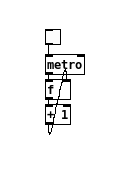
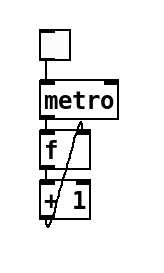
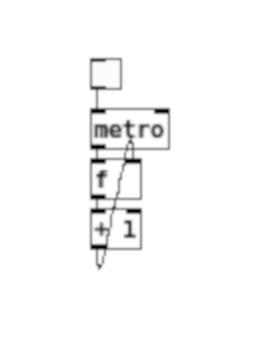
Game of Life - new attempt
here is a completely different attempt: the game of life runs on a glsl shader.
i played with that before, but i think know i understood how to customize the shader and also change the rules. it is surprisingly fast, i cannot imagine that the hashlife algorithm can be faster. 
https://nullprogram.com/blog/2014/06/10/ this blog was really helpful...
a few drawbacks are that the grid is not borderless anymore (not sure how to change that in the shader),
and that it is only possible to save/copy/paste patterns that are created with mouse clicks...
and it seems difficult to grab the data from the shader for sequencing tones for example...
here is the patch: gol_shader_v001.zip
https://github.com/Jonathhhan/PDGameofLife-shaderVersion-
this is the fragment shader:
uniform sampler2D Tex0;
uniform vec2 resolution;
uniform int lCell_1;
uniform int lCell_2;
uniform int lCell_3;
uniform int lCell_4;
uniform int lCell_5;
uniform int lCell_6;
uniform int lCell_7;
uniform int lCell_8;
uniform int dCell_1;
uniform int dCell_2;
uniform int dCell_3;
uniform int dCell_4;
uniform int dCell_5;
uniform int dCell_6;
uniform int dCell_7;
uniform int dCell_8;
int get(int x, int y) {
return int(texture2D(Tex0, (gl_FragCoord.xy + vec2(x, y)) / resolution).r);
}
void main() {
int sum = get(-1, -1) +
get(-1, 0) +
get(-1, 1) +
get( 0, -1) +
get( 0, 1) +
get( 1, -1) +
get( 1, 0) +
get( 1, 1);
int state = get(0, 0);
if (sum == lCell_1 && state == 0 ||
sum == lCell_2 && state == 0 ||
sum == lCell_3 && state == 0 ||
sum == lCell_4 && state == 0 ||
sum == lCell_5 && state == 0 ||
sum == lCell_6 && state == 0 ||
sum == lCell_7 && state == 0 ||
sum == lCell_8 && state == 0) {
gl_FragColor = vec4(0.0, 0.0, 0.0, 1.0);
} else if (sum == dCell_1 && state == 1 ||
sum == dCell_2 && state == 1 ||
sum == dCell_3 && state == 1 ||
sum == dCell_4 && state == 1 ||
sum == dCell_5 && state == 1 ||
sum == dCell_6 && state == 1 ||
sum == dCell_7 && state == 1 ||
sum == dCell_8 && state == 1 ) {
gl_FragColor = vec4(0.0, 0.0, 0.0, 1.0);
} else {
gl_FragColor = vec4(1.0, 1.0, 1.0, 1.0);
}
}
also useful as a visual noise generator 
Fresh Pd 0.50.2 install comes with broken libs and deken installs broken libs
@seb-harmonik-ar thanks, yes, I had set the path to zexy in my preferences. The objects would not created not only in my own patches bu also in their own help files. And with the same prefs path, my old zexy works fine, while the newly downloaded zexy from deken is broken. Not all objects are broken but many of them. I checked a few help file at random and 4/5 help files had broken objects.
Anyway, I did more testing and I'm a little baffled. It turns out that whether I add zexy to the path preferences or not is completely irrelevant. If I do it or not, zexy from deken doesn't work.
The lib works only when I include [declare -lib zexy -path zexy], as Seb suggested. Now, this doesn't really make sense from a user point of view: first, because this is not indicated anywhere, and second, because the declare object is not included in zexy's own help files. This means that when one uses the Pd Browser to open some zexy help files, most patches are broken because zexy itself doesn't get loaded by its own help files. Am I missing something here? This seems to me a weird approach, does anybody knows whether this is wanted by IOhannes (who I think is the maintainer)?
@oid Yes, that's exactly what I find confusing, and I agree with you that deken should follow conventions. That said, from a brief research on AMD64_32, it would seem that it refers to code compiled so as to run as 32-bit on a 64-bit system.
See for instance: https://www.oracle.com/database/technologies/instant-client/linux-amd64-downloads.html
https://wiki.gentoo.org/wiki/Project:AMD64/32-bit_Chroot_Guide
In any case, as per my message above the AMD64_32 version works, but only with [declare].
(and zexy versions from 2015 in deken are named AMD64_64, by the way).
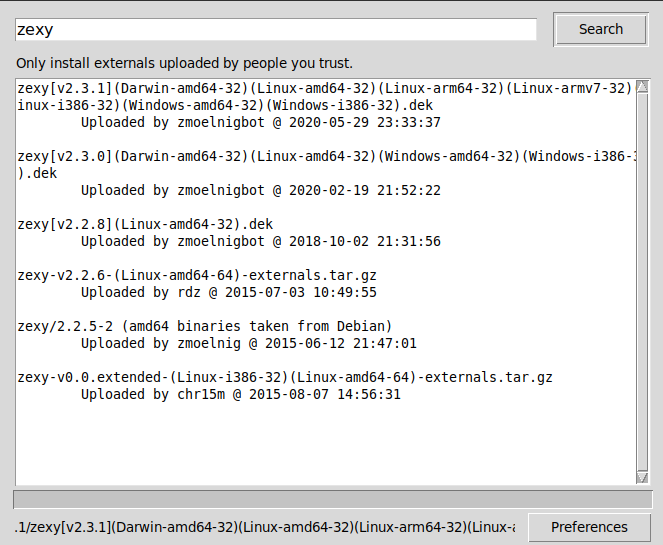
mmmm....
Nek'Sum - An advanced drone/texture monophonic synthesizer <- [v6.0] + // Mandarin Edition //
Nek'Sum-6 drone/texture monophonic synthesizer is compose of 5 stages :
First stage -> 3 main OSC with noise mixer option and generative synthesis support with 5 types of waves (tri,sqr,saw,supersaw,generative).
Second stage -> Filter stage with morph option and 4 filters types : Pass through, Lowpass, Highpass, Bandpass for the first stage.
Third stage -> 3 LFO (sin,tri,sqr,saw) modulators for the second stage.
Forth stage -> 3 Phasor's for the third stage.
Fifth stage -> 1 Deep Reverb with Lowpass filter for the forth stage.
It is capable of generating a large soundscape of drone/texture sounds inspired by The Doctor.
-UPDATE-
Thanks to Seven of Nine Nek'Sum is now at version [v6.0]
- Added Mandarin edition after cyber-brainstorming with Jade Chia-Jung [v6.0].
- Translation of the Ancient Egyption logo into obscure dialect of Anquietas language, thanks to Daniel Jackson [v6.0].
- Thanks to Nox cyberart society now the GUI is much better [v5.0].
- Added reset, randomization and resize for the generative synthesis [v5.0].
- Added generative synthesis support for each oscillator [v4.0].
- Added a noise mixer with 4 types of noise for each oscillator (orange,yellow,blue,pink) [v3.0].
- Added a morphing mechanism for filter stage [v3.0].
- This new version has a better GUI interface powered by a Borg-Casimir engine [v2.0].
-CYBERLOG-
Project manager : Oma Desala
Programming/UX design : Boran Robert Andrei
QA engineer : Anubis
Generative synthesis system design/Lead engineer : Seven of Nine
DSP engineering : Jade Chia-Jung, The Doctor
Testing/debugging system engineer : Lt. Colonel Samantha Carter
Language consultant : Daniel Jackson
Patch Download English Edition :
Nek'Sum 6.rar
Nek'Sum 5.rar
Nek'Sum 4.rar
Nek'Sum 3.rar
Nek'Sum2.rar
Nek'Sum.zip
Patch Download Mandarin Edition :
Nek'Sum 6 - Mandarin Edition.rar
Mandarin special edition :
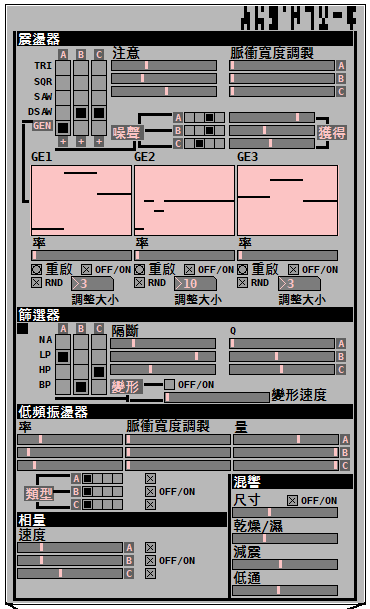
Snapshots :
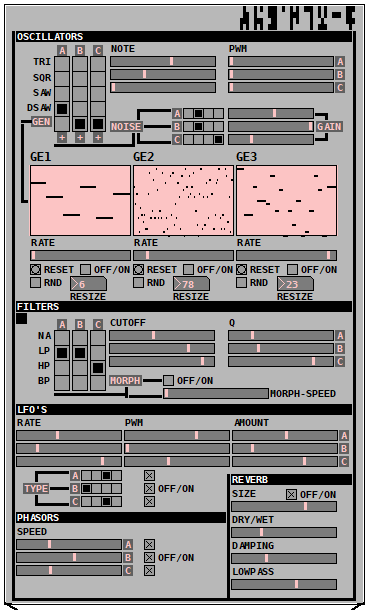
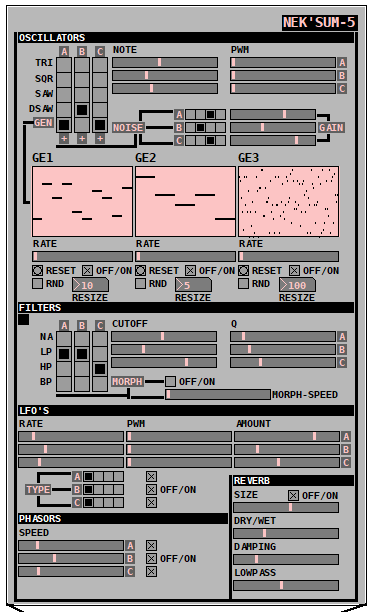
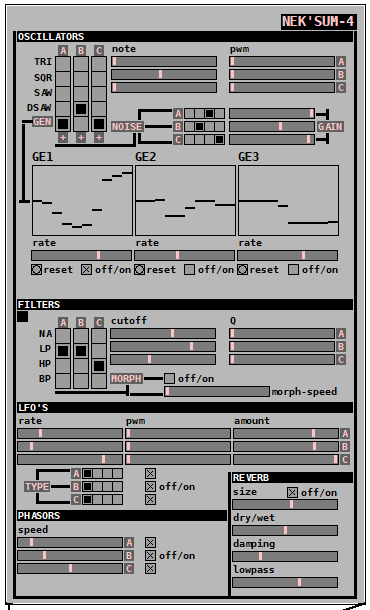
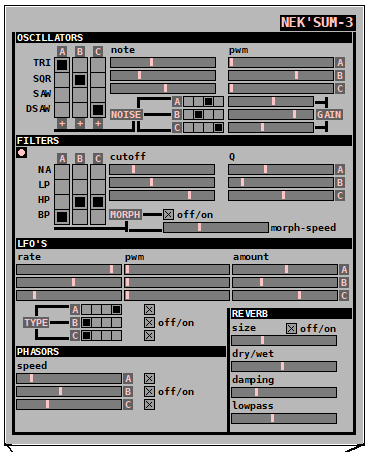
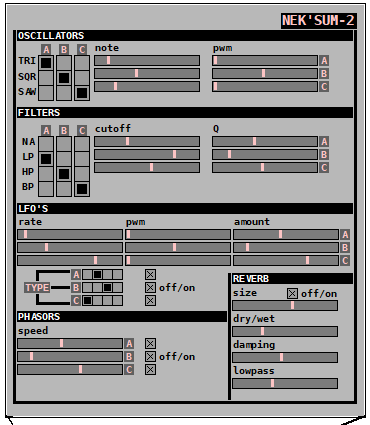
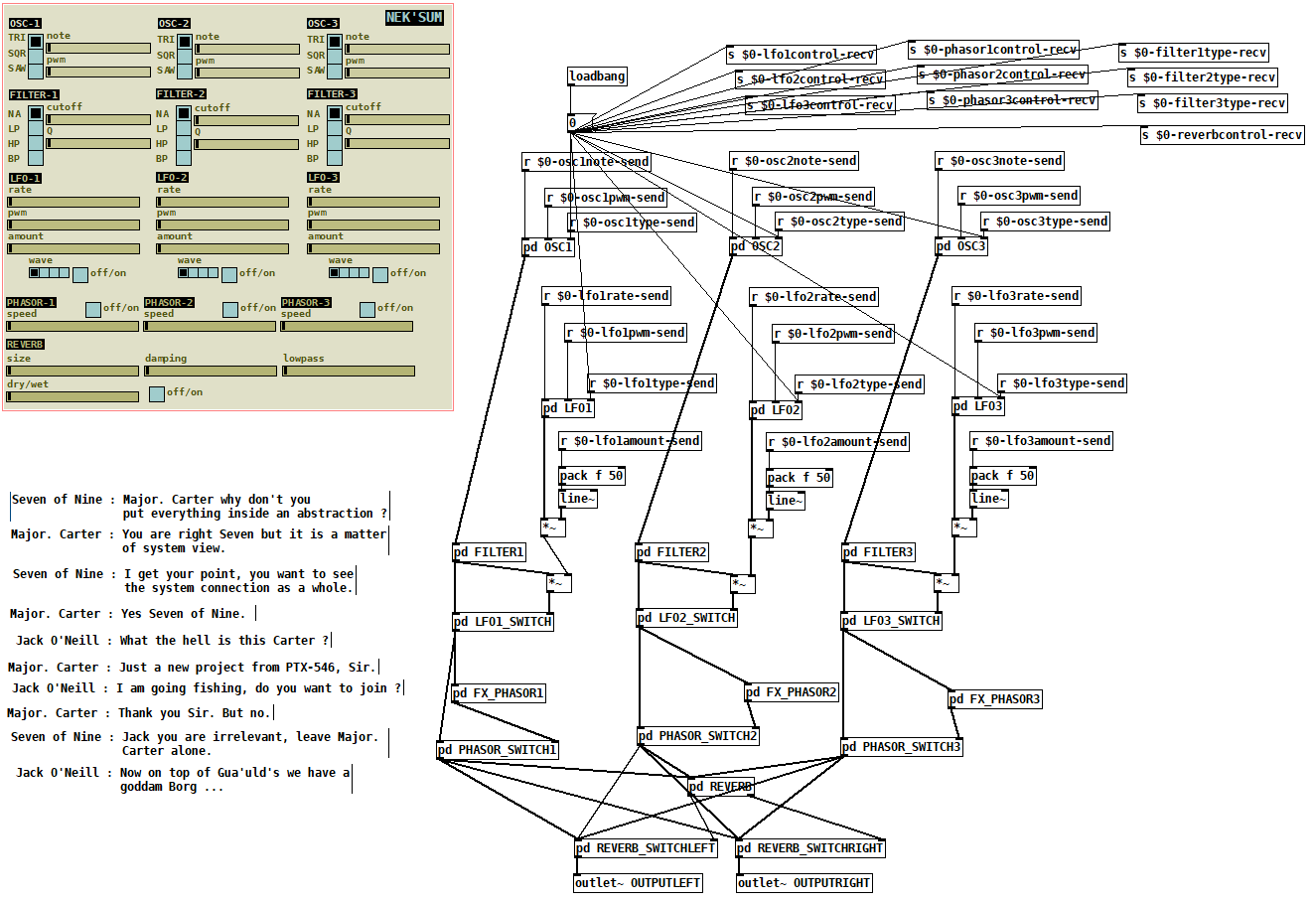
PD's scheduler, timing, control-rate, audio-rate, block-size, (sub)sample accuracy,
Hello, 
this is going to be a long one.
After years of using PD, I am still confused about its' timing and schedueling.
I have collected many snippets from here and there about this topic,
-wich all together are really confusing to me.
*I think it is very important to understand how timing works in detail for low-level programming … *
(For example the number of heavy jittering sequencers in hard and software make me wonder what sequencers are made actually for ? lol )
This is a collection of my findings regarding this topic, a bit messy and with confused questions.
I hope we can shed some light on this.



- a)
The first time, I had issues with the PD-scheduler vs. how I thought my patch should work is described here:
https://forum.pdpatchrepo.info/topic/11615/bang-bug-when-block-1-1-1-bang-on-every-sample
The answers where:
„
[...] it's just that messages actually only process every 64 samples at the least. You can get a bang every sample with [metro 1 1 samp] but it should be noted that most pd message objects only interact with each other at 64-sample boundaries, there are some that use the elapsed logical time to get times in between though (like vsnapshot~)
also this seems like a very inefficient way to do per-sample processing..
https://github.com/sebshader/shadylib http://www.openprocessing.org/user/29118
seb-harmonik.ar posted about a year ago , last edited by seb-harmonik.ar about a year ago
• 1
whale-av
@lacuna An excellent simple explanation from @seb-harmonik.ar.
Chapter 2.5 onwards for more info....... http://puredata.info/docs/manuals/pd/x2.htm
David.
“
There is written: http://puredata.info/docs/manuals/pd/x2.htm
„2.5. scheduling
Pd uses 64-bit floating point numbers to represent time, providing sample accuracy and essentially never overflowing. Time appears to the user in milliseconds.
2.5.1. audio and messages
Audio and message processing are interleaved in Pd. Audio processing is scheduled every 64 samples at Pd's sample rate; at 44100 Hz. this gives a period of 1.45 milliseconds. You may turn DSP computation on and off by sending the "pd" object the messages "dsp 1" and "dsp 0."
In the intervals between, delays might time out or external conditions might arise (incoming MIDI, mouse clicks, or whatnot). These may cause a cascade of depth-first message passing; each such message cascade is completely run out before the next message or DSP tick is computed. Messages are never passed to objects during a DSP tick; the ticks are atomic and parameter changes sent to different objects in any given message cascade take effect simultaneously.
In the middle of a message cascade you may schedule another one at a delay of zero. This delayed cascade happens after the present cascade has finished, but at the same logical time.
2.5.2. computation load
The Pd scheduler maintains a (user-specified) lead on its computations; that is, it tries to keep ahead of real time by a small amount in order to be able to absorb unpredictable, momentary increases in computation time. This is specified using the "audiobuffer" or "frags" command line flags (see getting Pd to run ).
If Pd gets late with respect to real time, gaps (either occasional or frequent) will appear in both the input and output audio streams. On the other hand, disk strewaming objects will work correctly, so that you may use Pd as a batch program with soundfile input and/or output. The "-nogui" and "-send" startup flags are provided to aid in doing this.
Pd's "realtime" computations compete for CPU time with its own GUI, which runs as a separate process. A flow control mechanism will be provided someday to prevent this from causing trouble, but it is in any case wise to avoid having too much drawing going on while Pd is trying to make sound. If a subwindow is closed, Pd suspends sending the GUI update messages for it; but not so for miniaturized windows as of version 0.32. You should really close them when you aren't using them.
2.5.3. determinism
All message cascades that are scheduled (via "delay" and its relatives) to happen before a given audio tick will happen as scheduled regardless of whether Pd as a whole is running on time; in other words, calculation is never reordered for any real-time considerations. This is done in order to make Pd's operation deterministic.
If a message cascade is started by an external event, a time tag is given it. These time tags are guaranteed to be consistent with the times at which timeouts are scheduled and DSP ticks are computed; i.e., time never decreases. (However, either Pd or a hardware driver may lie about the physical time an input arrives; this depends on the operating system.) "Timer" objects which meaure time intervals measure them in terms of the logical time stamps of the message cascades, so that timing a "delay" object always gives exactly the theoretical value. (There is, however, a "realtime" object that measures real time, with nondeterministic results.)
If two message cascades are scheduled for the same logical time, they are carried out in the order they were scheduled.
“
[block~ smaller then 64] doesn't change the interval of message-control-domain-calculation?,
Only the size of the audio-samples calculated at once is decreased?
Is this the reason [block~] should always be … 128 64 32 16 8 4 2 1, nothing inbetween, because else it would mess with the calculation every 64 samples?
How do I know which messages are handeled inbetween smaller blocksizes the 64 and which are not?
How does [vline~] execute?
Does it calculate between sample 64 and 65 a ramp of samples with a delay beforehand, calculated in samples, too - running like a "stupid array" in audio-rate?
While sample 1-64 are running, PD does audio only?
[metro 1 1 samp]
How could I have known that? The helpfile doesn't mention this. EDIT: yes, it does.
(Offtopic: actually the whole forum is full of pd-vocabular-questions)
How is this calculation being done?
But you can „use“ the metro counts every 64 samples only, don't you?
Is the timing of [metro] exact? Will the milliseconds dialed in be on point or jittering with the 64 samples interval?
Even if it is exact the upcoming calculation will happen in that 64 sample frame!?
- b )


There are [phasor~], [vphasor~] and [vphasor2~] … and [vsamphold~]
https://forum.pdpatchrepo.info/topic/10192/vphasor-and-vphasor2-subsample-accurate-phasors
“Ive been getting back into Pd lately and have been messing around with some granular stuff. A few years ago I posted a [vphasor.mmb~] abstraction that made the phase reset of [phasor~] sample-accurate using vanilla objects. Unfortunately, I'm finding that with pitch-synchronous granular synthesis, sample accuracy isn't accurate enough. There's still a little jitter that causes a little bit of noise. So I went ahead and made an external to fix this issue, and I know a lot of people have wanted this so I thought I'd share.
[vphasor~] acts just like [phasor~], except the phase resets with subsample accuracy at the moment the message is sent. I think it's about as accurate as Pd will allow, though I don't pretend to be an expert C programmer or know Pd's api that well. But it seems to be about as accurate as [vline~]. (Actually, I've found that [vline~] starts its ramp a sample early, which is some unexpected behavior.)
[…]
“
- c)



Later I discovered that PD has jittery Midi because it doesn't handle Midi at a higher priority then everything else (GUI, OSC, message-domain ect.)
EDIT:
Tryed roundtrip-midi-messages with -nogui flag:
still some jitter.
Didn't try -nosleep flag yet (see below)
- d)

So I looked into the sources of PD:
scheduler with m_mainloop()
https://github.com/pure-data/pure-data/blob/master/src/m_sched.c
And found this paper
Scheduler explained (in German):
https://iaem.at/kurse/ss19/iaa/pdscheduler.pdf/view
wich explains the interleaving of control and audio domain as in the text of @seb-harmonik.ar with some drawings
plus the distinction between the two (control vs audio / realtime vs logical time / xruns vs burst batch processing).
And the "timestamping objects" listed below.
And the mainloop:
Loop
- messages (var.duration)
- dsp (rel.const.duration)
- sleep
With
[block~ 1 1 1]
calculations in the control-domain are done between every sample? But there is still a 64 sample interval somehow?
Why is [block~ 1 1 1] more expensive? The amount of data is the same!? Is this the overhead which makes the difference? Calling up operations ect.?
Timing-relevant objects
from iemlib:
[...]
iem_blocksize~ blocksize of a window in samples
iem_samplerate~ samplerate of a window in Hertz
------------------ t3~ - time-tagged-trigger --------------------
-- inputmessages allow a sample-accurate access to signalshape --
t3_sig~ time tagged trigger sig~
t3_line~ time tagged trigger line~
--------------- t3 - time-tagged-trigger ---------------------
----------- a time-tag is prepended to each message -----------
----- so these objects allow a sample-accurate access to ------
---------- the signal-objects t3_sig~ and t3_line~ ------------
t3_bpe time tagged trigger break point envelope
t3_delay time tagged trigger delay
t3_metro time tagged trigger metronom
t3_timer time tagged trigger timer
[...]
What are different use-cases of [line~] [vline~] and [t3_line~]?
And of [phasor~] [vphasor~] and [vphasor2~]?
When should I use [block~ 1 1 1] and when shouldn't I?
[line~] starts at block boundaries defined with [block~] and ends in exact timing?
[vline~] starts the line within the block?
and [t3_line~]???? Are they some kind of interrupt? Shortcutting within sheduling???
- c) again)

https://forum.pdpatchrepo.info/topic/1114/smooth-midi-clock-jitter/2
I read this in the html help for Pd:
„
MIDI and sleepgrain
In Linux, if you ask for "pd -midioutdev 1" for instance, you get /dev/midi0 or /dev/midi00 (or even /dev/midi). "-midioutdev 45" would be /dev/midi44. In NT, device number 0 is the "MIDI mapper", which is the default MIDI device you selected from the control panel; counting from one, the device numbers are card numbers as listed by "pd -listdev."
The "sleepgrain" controls how long (in milliseconds) Pd sleeps between periods of computation. This is normally the audio buffer divided by 4, but no less than 0.1 and no more than 5. On most OSes, ingoing and outgoing MIDI is quantized to this value, so if you care about MIDI timing, reduce this to 1 or less.
„
Why is there the „sleep-time“ of PD? For energy-saving??????
This seems to slow down the whole process-chain?
Can I control this with a startup flag or from withing PD? Or only in the sources?
There is a startup-flag for loading a different scheduler, wich is not documented how to use.
- e)

[pd~] helpfile says:
ATTENTION: DSP must be running in this process for the sub-process to run. This is because its clock is slaved to audio I/O it gets from us!
Doesn't [pd~] work within a Camomile plugin!?
How are things scheduled in Camomile? How is the communication with the DAW handled?
- f)

and slightly off-topic:
There is a batch mode:
https://forum.pdpatchrepo.info/topic/11776/sigmund-fiddle-or-helmholtz-faster-than-realtime/9
EDIT:
- g)
I didn't look into it, but there is:
https://grrrr.org/research/software/
clk – Syncable clocking objects for Pure Data and Max
This library implements a number of objects for highly precise and persistently stable timing, e.g. for the control of long-lasting sound installations or other complex time-related processes.
Sorry for the mess!
Could you please help me to sort things a bit? Mabye some real-world examples would help, too.

Purr Data 2.10.0 released
Purr Data 2.10.0 is now available:
https://github.com/jonwwilkes/purr-data/releases/tag/2.10.0
Changes:
- iem_spec2/spec2_tabreceive_enable~: fix array error handler and set sane default array name value
- fix partconv crashers in bsaylor lib and add perfroutine for array errors
- adaptive/nlms3~: fix typo that caused a double free
- fix lyonpotpourri crashers in dsp, perform and constructor routines
- at least keep the inoperable streamout13~ and streamin13~ from crashing when instantiating
- use some sane default values in ekext/lpreson~ to prevent segfault
- quick fixes to keep cxc/mean~ from crashing when dsp is turned on
- greatly reduce undefined behavior in all dsp objects
- fix hex2dec so that it actually does something useful
- fix #523: crash with manual width adjustment on subpatch
- add ability to change makefile flags for Gem from toplevel makefile
- fix stray bugs detected by obs
- unauthorized/cooled~: increase string buffer size to accommodate the terminating nul character
- unauthorized/cooled~: fix memory access bug trying to concatenate into a string constant
- iemmatrix/mtx_dispersive_dline: add missing void return type
- allow make options like -j8 to be passed to the Gem compilation, which takes awfully long on a single cpu.
- cxc/cxc_split: fix use of un-initialized pointer
- ggee/serial_bird: fix undefined behavior with the ++ operator
- ext13/scramble~: fix header for scramble~
- jasch_lib/detox/detox: reformat for sanity's sake, fix array overflow, undefined behavior
- linux desktop: remove the -rt -audiobuf options from the desktop files.
- linux desktop: change DEFAULTADVANCE to 20 ms for Linux.
- linux desktop: remove leftover TargetEnvironment=Unity lines in menu entries for Purr Data
- linux desktop: add some comments and a few more useful desktop action examples to the main desktop file, so that the user understands how to adjust these if needed.
- linux desktop: replace pd-gui -> nw in the ForceQuit actions, which is the proper name of the GUI program on Linux
- linux desktop: remove useless %U arguments from desktop actions.
- linux desktop: invoke desktop actions via /bin/sh.
- linux desktop: migrate the desktop actions from the ancient Unity syntax to the current freedesktop.org standard
- linux desktop: remove sticky options from the desktop files. For now, keep -rt -audiobuf 20.
- Gem: sync with https://github.com/umlaeute/Gem, QT4L and startup issues have been fixed
- linux: fix the Debian control files once again, since the dependency auto-detection needs a Depends line in there.
- debuild: Support for ARM (e.g., Raspbian)
- update nw-update to nw.js 0.24.4 to fix font issues under Linux
- backport 'add-to-path' from vanilla rev. c917dd19, to make Gem happy.
- usability improvements in the documentation browser.
- switch Gem to the latest from upstream.
- add missing dlls for fluid~ on Windows. Fixes #540.
- Debian packaging: Demote python and fluid-soundfont dependencies, as suggested in #540.
- polish the externals/Makefile clean targets, and delete redundant files in repo
- fix compile options for Xcode 10 - fftease and lyonpotpourri externals.
- update pd-lua to latest upstream.
- fix compile options for Xcode 10 - externals and abstractions.
- fix compile options for Xcode 10.
- ios header needs to be included before base64.h, to avoid compile errors on macOS 10.14.
- fix improper string access in pd_getdirname on Mac.
- fix list cat crasher, update help patch, add missing test abstractions
- get rid of obsolete and unneeded unicap and sndobj dependencies on Linux.
- mark some globals as extern to fix compilation if g_canvas.h is included more than once
Please report bugs here:



